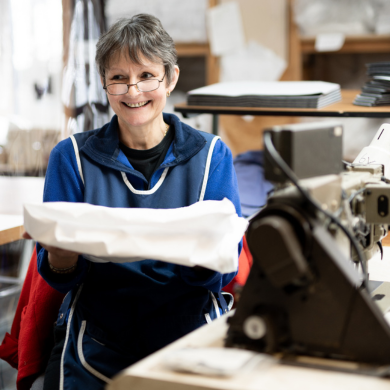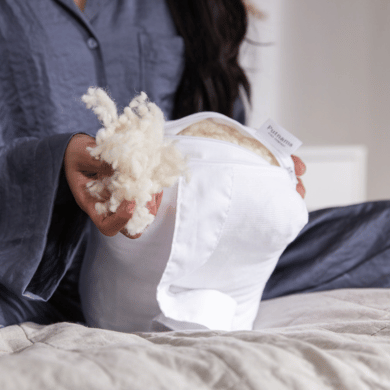
The Ultimate Guide to Pillows for Kyphosis: Sleep Better with Proper Support
Struggling to find a comfortable sleeping position can turn nights into a restless experience if you have kyphosis (sometimes referred to a Dowager's hump) or Scheuermann's kyphosis. It is estimated that approx. 8% of the general population and is more prevalent in boys rather than girls. This spinal condition, which affects the natural curvature of the upper back, can make getting a good night's sleep a challenge.
However, with the right support, particularly in the form of specialised pillows, you can transform your sleep quality and wake up refreshed and pain-free. In this guide, we will explore everything you need to know about kyphosis, its impact on sleep, and how to choose the perfect pillow to enhance your well-being.
Understanding Kyphosis
So, what exactly is kyphosis?
Kyphosis is a condition characterized by an excessive forward curvature of the thoracic spine, leading to a hunched or rounded upper back. While some degree of spinal curvature is normal, kyphosis involves a curve greater than 45 degrees. The condition can occur at any age, but it is most commonly seen in older adults due to degenerative spine changes. Younger individuals, particularly those with poor posture, can also develop kyphosis over time.
Scheuermann's kyphosis is a condition most common among adolescence.
Causes for kyphosis range from congenital spinal deformities to conditions like osteoporosis and arthritis.
For many kyphosis sufferers, the condition can lead to physical discomfort, including back pain and stiffness. In severe cases, it can impair breathing and digestion due to the chest cavity's reduced space.
Emotional well-being might also be affected, especially if individuals feel self-conscious about their posture. Understanding kyphosis and its causes is crucial to finding effective management strategies, including choosing appropriate sleep support.
How Kyphosis Affects Sleep
Quality sleep can be elusive for those with kyphosis due to the discomfort and pain associated with the condition.
The unnatural curvature can place extra stress on the spine, contributing to muscle tension and pressure points that make it difficult to find a comfortable sleeping position. This restlessness can reduce overall sleep quality, leading to fatigue and affecting daily life activities.
The relationship between sleep posture and kyphosis is significant.
Poor sleep positioning can exacerbate spinal misalignment, increasing discomfort and causing a cycle of restless sleep. Thus, finding ways to improve sleep posture is essential for reducing pain and enhancing sleep quality.
Simple adjustments, such as using the right pillow and mattress, can make a significant difference in alleviating kyphosis symptoms during sleep.
The Benefits of Specialized Pillows for Kyphosis
Specialised pillows for kyphosis are designed to provide optimal support and alignment for the spine, helping to relieve pressure and discomfort. These pillows accommodate the unique needs of those with kyphosis by supporting the neck and upper back's natural curve.
This type of support helps maintain spinal alignment during sleep, reducing strain on the muscles and joints.
Orthopaedic pillows for kyphosis are often crafted with materials like memory foam, which conforms to the shape of your body, ensuring personalized support.
Some pillows feature adjustable components that allow users to customize the pillow's height and firmness to suit their preference. By using a specialized pillow, individuals with kyphosis can experience reduced pain and improved sleep quality, leading to increased energy levels and better overall health.
Choosing the Right Pillow for Kyphosis
Selecting the best pillow for kyphosis involves considering several factors to ensure optimal comfort and support.
First, consider the pillow's material. Memory foam and graphite latex are popular choices as they offer excellent support and conformability. Look for pillows specifically designed for neck and spine support, as they are tailored to align with the natural curves of the body.
Next, consider the pillow's firmness. While some people prefer soft pillows, those with kyphosis may benefit from medium to firm options that provide more substantial support. Adjustable pillows can be a great choice, allowing users to customize the height and firmness according to their needs.
Finally, pay attention to the pillow's size and shape. Contoured pillows that cradle the neck and shoulders are ideal for maintaining proper alignment. Be sure to choose a pillow that fits your preferred sleeping position, whether you are a back, side, or stomach sleeper.
How to Sleep Comfortably with Kyphosis
Finding a comfortable sleeping position is key to managing kyphosis symptoms. For many, sleeping on the back is the best option as it evenly distributes weight and supports the spine's natural curvature. It is important to use a supportive pillow that maintains the neck and upper back's alignment without causing the head to tilt forward.
If sleeping on your side is preferred, place a pillow between your knees to align the hips and minimize spinal stress. Avoid curling into a fetal position, as this can exacerbate kyphosis symptoms.
Experimenting with different sleeping positions and pillow types can help you determine what works best for your body.
Aside from pillow choice, creating a comfortable sleep environment is essential. Choose a mattress or mattress topper that provides adequate support without being too firm or too soft. Maintaining a cool, dark, and quiet bedroom can also promote better sleep quality and help you wake up refreshed. (Switch Off, Relax, and Embrace the Secret Art of 'Beditation').
Rest Assured a Better Sleep Solution is just Round the Corner
Living with kyphosis does not mean you have to compromise on sleep quality. By understanding the condition's impact on your sleep and choosing the right pillow for kyphosis sleep support, you can improve your sleep experience and overall well-being.
Remember, the key to comfortable sleep lies in proper spinal alignment and support. A specialised pillow designed for kyphosis can make a significant difference in relieving pain and enhancing rest.
If you're ready to explore the benefits of optimized sleep support further, consider consulting with health professionals or exploring available orthopaedic pillow options designed for kyphosis relief. With the right tools and knowledge, better sleep is just round the corner, bringing you one step closer to a healthier, more rested life. Our team are always on hand to help with decades of experience and a love for helping customers our help team will find the perfect orthopaedic pillow for kyphosis to suit you.


















A memory foam pillow is always a popular choice as they offer excellent support and conformability. The memory foam contour pillow or memory foam Putnam Pillow provide optimum neck and spine support. It is always difficult to advise but please note that all of our pillows are supplied in a sealed hygiene bag. As long as the pillow remains sealed in the bag then it can be returned within 14 days or receipt.
Looking for a pillow for veteran husband who has kyphosis, with neck and spine fused together. He can’t put his neck back. He basically has to sleep on his back with head elevated. Very uncomfortable. Please advise.
73 yr female with kyphosis
Looking for a good pillow to help
Leave a comment